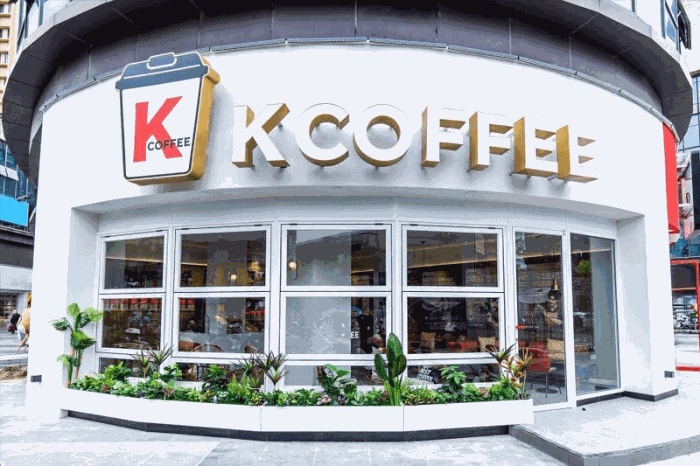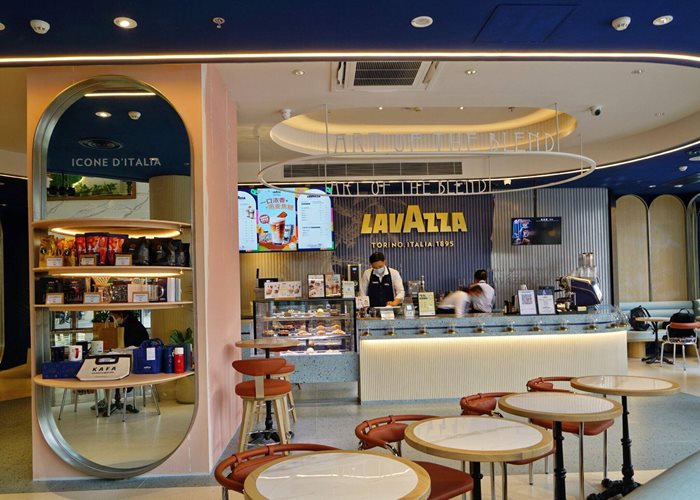Established in 2016, Yum China has built China’s largest quick service restaurant portfolio with more than 14,000 licensed outlets across six brands, including KFC, Pizza Hut and a joint venture with Lavazza. Today, the group is harnessing the vast potential of China’s booming coffee market with a two-pronged strategy tapping into the value-focused and premium segments. Warton Wang, General Manager for KFC China, and Adrian Ding, Yum China’s Chief Investment Officer and General Manager for its Lavazza joint venture, speak to World Coffee Portal about leveraging the power of coffee across its extensive out-of-home network
.png.aspx?lang=en-GB&width=700&height=394)
A KCOFFEE boutique store in Xiaogan, Hubei | Photo credit: Yum China
In a just a few short years China’s branded coffee shop market has evolved from relative obscurity to becoming the largest by outlets on the planet. Today, the Chinese branded coffee shop market is a thriving eco-system of value-focused operators, such as the formidable 13,300-strong Luckin Coffee, a strong international presence led by Starbucks, Tim Hortons and Costa Coffee alongside boutique operators including Blue Bottle, % Arabica and Seesaw Coffee.
While each has found success in its segment, Yum China is seeking to harness the immense potential of coffee among both value-driven and high-end consumers.
Formed as a spin-off business from US-based Yum! Brands in 2016, Yum China operates over 14,000 licensed outlets across six food service brands, led by global fast-food giants KFC and Pizza Hut with around 10,000 and 3,200 stores respectively.
With sky-high rents for prime locations in Shanghai, Beijing and Guangzhou, Yum China has adopted a multi-day part strategy with a diverse food and beverage menu to ensure group profitability – and coffee is a key pillar of this approach.
Yum China offers its value-focused KCOFFEE range alongside premium Lavazza coffee shops as part of a joint venture with the iconic Italian coffee roaster, which will also supply coffee to its extensive Pizza Hut portfolio. In doing so, the franchise operator has set out to achieve significant multi-segment coverage of the Chinese coffee market.
Having launched an upgraded premium coffee offer across its KFC estate in 2014, Yum China began serving its own-brand KCOFFEE in store in 2015 and by 2021 was serving around 170 million cups per year.
Now served at nearly all of Yum China’s 10,000 KFC restaurants in China – giving it a nationwide reach nearly three times that of McCafé and making it among the largest reach of any coffee operator in the country – KFC has equipped its stores with fully automatic coffee machines to ensure efficiency and consistency.
“We set a clear goal to steadily launch high-quality products at friendly prices”
Originally conceived to offer ‘functionality and affordability’, Yum China developed KCOFFEE to keep pace with the developing demands and inclinations of China’s maturing coffee consumers.
“We set a clear goal to steadily launch high-quality products at friendly prices, with a strong presence nationwide,” says Warton Wang, General Manager of KFC China.
With beverage prices starting from RMB 9 ($1.25), KCOFFEE has maintained its budget-friendly appeal in competition with Luckin Coffee, which deploys heavy discounting to offer beverages from RMB 10-20 ($1.39-$2.79).
In comparison, Tims China’s price range is RMB 15-30 ($2.10-$4.18) – the latter also being the cost of an americano at Starbucks.

A KCOFFEE store in Yingcheng, Hubei province | Photo credit: Yum China
In a bid to expand KCOFFEE in lower-tier cities, Yum China explored a ‘side-by-side’ store format before launching its first dedicated KCOFFEE outlet in October 2022 with a To-Go store in Shanghai.
The success of its independent coffee shop concept among China’s 280 million Gen Z consumers has led Yum China to rapidly scale its standalone KCOFFEE footprint, with its latest stores in Xiaogang, Hubei, and Changyi, Shandong, pushing the network above 200 stores.
“The all-new KCOFFEE stores have become popular locations for social media posts while new products, such as the Iced Sparkling Americano with Zesty Lemon and Carrot Americano have been well received by consumers,” says Wang.
The number of KCOFFEE points of sale will continue to ‘increase rapidly’ across the next 12 months, led by standalone outlet development. Yum China also plans to deploy coffee trucks and pop-up kiosks at street markets and during holidays in the near future.
The business forecasts it will maintain double-digit year-on-year growth in its KCOFFEE business, increasing sales volume by 30% by the end of 2023 and accelerating outlet expansion to lower-tier cities from next year.
The Italian connection
If KCOFFEE was conceived to be affordable, Yum China’s Lavazza joint venture aims to offer an accessible premium and contemporary Italian experience for local consumers.
The foodservice giant partnered with Lavazza in May 2020 to establish its premium coffee shop concept across China, with the Italian coffee roaster holding a 30% share.
Speaking on the occasion of the opening of its first store in Shanghai in the same month, Lavazza Group CEO Antonio Baravalle said China represented ‘huge untapped potential for coffee consumption’.
In September 2021 the two companies announced a $200m investment to scale the concept across China. As of November 2023, there were 107 boutique Lavazza stores across 12 Chinese cities, including Beijing, Guangzhou, Shanghai, Shenzhen and Wuhan.
Blending classic and contemporary design, Yum China currently operates four Lavazza store formats – 1,200 sq ft flagship outlets, standard sites for high streets, compact stores of up to 860 sq ft for shopping centres and a lobby model deployed in offices and public buildings.
While proving alluring with its upmarket in-store experience, Yum China has also evolved to meet undiminished customer demand for convenience.
Eighty-seven percent of Chinese consumers surveyed by World Coffee Portal in November 2023 had ordered a beverage from a coffee shop to be delivered over the last 12 months, with 57% ordering coffee for delivery more often than making in-store visits.
Currently, 70% of Lavazza’s sales in China come from digital orders, up from 46% in 2021, with 37% of total sales in the first six months of 2023 contributed via delivery.
“With off-premises consumption booming across China, delivery is a key growth driver for us,” says Adrian Ding, Yum China’s Chief Investment Officer and General Manager for its Lavazza joint venture.
Alongside catalysing the popularity of app-based ordering and delivery, Ding says tapping into Lavazza’s 128-year heritage helps distinguish the iconic brand in China’s increasingly competitive branded coffee shop market.
“As Italy’s leading coffee company, Lavazza has contributed to building the global popularity of espresso-based beverages. We are leveraging these unique branding assets to promote our coffee expertise to our target consumer groups, including white-collar professionals, Gen-Z coffee lovers, affluent middle-class consumers and family-oriented coffee enthusiasts,” Ding says.

A Lavazza store in Shanghai | Photo credit: Yum China
Harnessing Lavazza’s history takes centre stage in Yum China’s marketing strategy. In March 2023, Yum China launched a free-of-charge Lavazza exhibition at Shanghai’s Sinan Mansions to showcase the coffee roaster’s retail products and barista-prepared coffee range. In October 2023 Lavazza sponsored the Rolex Shanghai Masters, a partnership that saw the roaster become the tournament’s exclusive coffee service provider.
“Communicating coffee and food rituals differentiates us from competition and brings our brand story to life for our consumers in a very real way,” explains Ding.
Offering products that cater to local taste preferences is also paramount. Yum China adds locally inspired beverages such as coconut and buffalo milk to its beverages, with the latter adding double-digit sales growth in the first month after its launch last year.
“All of the above aspects are helping us win over consumer recognition, build our brand equity and effectively grow our business,” Ding adds.
Developing its retail offering
Alongside a growing coffee shop footprint, Lavazza says retail distribution is the other ‘engine’ driving its business growth.
Backed by strong brand recognition in the packaged retail segment, including coffee pod products, Lavazza has also developed B2B partnerships with upscale hotels and high-end restaurants, as well as workplaces and supermarkets.
“As we continue to build our retail engine, we will also introduce more product categories tailored to the local Chinese retail market,” Ding says.
This includes Lavazza’s single origin Yunnan range, which is currently only sold in China. Located in southern China, the province of Yunnan is renowned for its high-grade specialty coffee and currently produces 98% of all coffee grown in China.
“With off-premise consumption booming across China, delivery is a key growth driver for us”
“We hope to make Lavazza a meaningful and cherished element in the daily lives of coffee lovers across China. I want to reiterate our excitement and passion for Lavazza – we aim to become a leading experiential coffee brand in China,” Ding concludes.
The fast-developing Chinese branded coffee shop market is not expected to hit the brakes any time soon and the market is poised for yet further phenomenal after overtaking the US market to exceed 49,600 outlets over the last year. With the country’s largest restaurant footprint, coupled with a foot in the door of the value-focused and premium coffee shop markets, Yum China is in a prime position to continue meeting demand for China’s increasingly caffeinated consumers – whatever the occasion.
This article was first published in Issue 17 of 5THWAVE magazine.
Subscribe to 5THWAVE to receive each edition in print and digitally or sign up to our newsletter and be the first to read the latest articles and updates on World Coffee Portal research.
